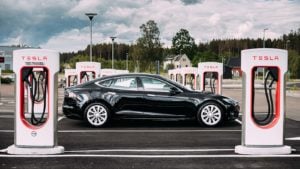Despite what appeared to be a catastrophic harbinger in the form of the novel coronavirus, certain market segments performed outstandingly in 2020. One of the biggest of course was electric vehicles. With their mechanically less-convoluted design, EVs represented an ideal platform for many people during the Covid-19 lockdowns. And while the sector is off to an auspicious start this year, many individual companies are candidates for overvalued stocks.
This is not to suggest that you should actively short frothy EV firms. Given the FOMO (fear of missing out) mindset that Wall Street has adopted, it’s very conceivable that even for those in bubble territory, overvalued stocks can continue to defy gravity. Rather, this list should be taken as a look into the other side of the argument. For conservative-minded investors, they may be better served by waiting for a discount.
One of the reasons I say this is the primary driver for EV sales. According to CNN Business, “the biggest reason people said they would buy an electric car is concern for the environment — about 80% of people who said they would buy an EV cited this as a reason. Next, 67% of people cited lower operating costs. Electricity costs much less per mile than gasoline or diesel fuel, and electric cars costs less to maintain since they have far fewer moving parts and don’t require oil changes.”
If CNN’s findings are accurate, this is a huge risk factor for EVs, which is why many of them are legitimately overvalued stocks – irrespective of their financial metrics. This suggests that as prospective buyers discover the holistic impact of EVs – particularly that some EV batteries incorporate cobalt, which may be regarded as a “blood” asset – sales could suffer.
I don’t want to overstate the problem. However, it’s possible that EVs could become the 21st century version of fur shaming. In addition, the fewer parts that facilitate greater reliability also means fewer jobs for Americans, as NBC News pointed out. That takes away from the “ESG” cred of EVs, adding another dynamic to the discussion regarding these overvalued stocks.
- Tesla (NASDAQ:TSLA)
- Nio (NYSE:NIO)
- Electrameccanica Vehicles (NASDAQ:SOLO)
- Kandi Technologies (NASDAQ:KNDI)
- Li Auto (NASDAQ:LI)
- Kaixin Auto (NASDAQ:KXIN)
- Blink Charging (NASDAQ:BLNK)
Now, to spare you the time in writing an angry email – again, I’m not saying short, I’m saying wait – let me disclose my personal biases. First, I’m an ICE (internal combustion engine) man, and (probably) will always be. Second, I see value in spreading energy consumption across the available spectrum of energy sources. Third, I’m not the biggest fan of California Governor Gavin Newsom, in part because of his EV extremism.
With that out of the way, let’s have a look at these overvalued stocks.
Tesla (TSLA)

Tesla is a perfect example of how a publicly traded company could be considered one of the overvalued stocks, yet it shouldn’t be shorted due to the risks of market irrationality. What happened on Jan. 7 provides a cautionary tale for bears who think that they have an easy shorting opportunity.
On this day, TSLA stock jumped higher by nearly 8%. Though I didn’t find anything fundamentally specific to justify the boost, on CNBC, billionaire investor Chamath Palihapitiya stated that Tesla shares could be worth three times its current valuation. That would make Tesla CEO Elon Musk the world’s first trillionaire.
“Delivering clean energy, allowing the world to be sustainable, is an incredibly important thing that will be rewarded by markets and individuals,” stated Palihapitiya. In other words, TSLA stock is an aspirational investment, as many of my InvestorPlace colleagues believe.
However, aspirations have to be backed up with sound justification, at some point. First, the fully sustainable world argument is disputed, according to the Institute for Energy Research. Second, Tesla’s own misfires, including the non-battery battery day, should warn you about the risks of overdependence on aspirations.
As I said, I’m not recommending shorting Tesla. But I do think it’s one of the overvalued stocks within the EV segment.
Nio (NIO)

Nio has been synonymous with global demand for EVs, so it’s not at all surprising that NIO stock accelerated the way it did last year. Obviously, the company has the benefit of operating in the world’s biggest automotive market. As well, we should keep in mind that the Chinese government has a vested interest in supporting its burgeoning EV industry.
On one hand, this is a net positive for NIO stock. First, China disincentivizes gasoline-powered cars and instead incentivizes EV sales by imposing a lottery system for the former and subsidies for the latter. Second, China has never gotten the hang of the combustion engine, which is a very technical process. But with the relatively simpler process of EV production, China is now a sector leader thanks in part to its prodigious manufacturing prowess.
But protectionism usually leads to poor quality. That’s exactly what Reuters reported on when it observed that Nio EVs didn’t perform up to spec. This situation implies that EV hype is baked into Nio shares and much of that isn’t fundamentally justified.
That’s not to say that NIO is a shorting candidate. But it does appear to be one of the overvalued stocks, suggesting a better price point ahead.
Electrameccanica Vehicles (SOLO)

Among overvalued stocks in the EV space, Electrameccanica Vehicles may be the one that sparks the most dichotomous opinions: either you love its flagship Solo vehicle, or you hate it. There might not be much in between. That’s understandable given that three-wheeled vehicles have never really taken off in the U.S. – or ultra-compact cars for that matter.
However, I completely get the bullish argument for SOLO stock. First, we’re in an EV-crazed market environment. Second, the Solo’s accessible price point attracts millennials who may want environmentally responsible transportation (or at least the perception of it). Third, as a single seater, it’s economically efficient for the stated purpose, commuting.
But there are also concerns about SOLO stock, namely that it’s a single seater. And that means the value proposition for the EV is actually quite expensive — $18,500 and no federal tax credit because it’s technically a motorcycle.
However, my biggest concern is competition. In researching viable private equity opportunities, I came across Aptera. This is a solar-powered EV (with the option to charge the battery) that is aerodynamically efficient, delivers exotic-car level acceleration, and seats a passenger and one pet.
Aptera could utterly dominate the three-wheeled EV market, which might make SOLO one of the overvalued stocks, even with its current discount off recent highs.
Kandi Technologies (KNDI)

As I mentioned above, small cars just don’t sell well in the U.S. The American consumer associates size with value, which is why companies analyze the psychology of packaging. Larger dimensions, even if the product itself is diminutive, can improve sales. Logically, I don’t see how Kandi Technologies can compete effectively over the long run.
True, KNDI stock is well off its recent highs. Fundamentally, though, I believe it’s one of the overvalued stocks with which you should approach cautiously. As NPR.org stated, the Trump administration pushed domestic automakers to build more small cars. But time and again, American consumers have voted with their wallets toward trucks and SUVs.
So, that’s one strike against KNDI stock. The other is that consumers give up a lot to buy Kandi’s EVs. Glaringly, the top speed of its Model K23 is only 72 miles per hour. 72 mph? Have you ever driven anywhere in the U.S.?
Moreover, the price point is subject to disruption. At $27,499 ($19,999 post-subsidy), the K23 is certainly accessible to many consumers. However, what happens when those subsidies dry up? A nearly $28,000 car that only goes 72 mph is too tough of a sell, even if it is electric.
Li Auto (LI)

Li Auto is a name bears want to be ultra-careful with. Frankly, the sentiment for EVs has gone berserk so this is not a train you want to deliberately bet against. Which, again, I’ll emphasize – this isn’t a list of overvalued stocks to short but rather to wait for conservative investors who don’t care for emotionally volatile markets.
With that said, I’m not terribly eager to jump aboard LI stock. While I understand that global demand is increasing for EVs and that the Chinese market is particularly compelling, the fundamentals haven’t panned out as well as I would have expected.
Primarily, many EV advocates have noted that when battery costs decline, the platform will be accessible to more people. However, battery costs have been declining substantially, to the tune of 85% between 2011 through 2020. Yet global EV unit sales have slowed significantly since 2018 relative to their meteoric growth in years past.
Moreover, if we have a global economic slowdown because of the Covid-19 pandemic – a not unreasonable theory, in my opinion – that’s going to hurt the Chinese consumer. I can’t imagine that would be helpful for LI stock.
Kaixin Auto (KXIN)

To be fair, it’s not entirely clear if Kaixin Auto deserves to be in this mix of overvalued stocks. Certainly, I question its valuation. But whether it’s an electric vehicle play is open to debate. According to Bloomberg, KXIN stock is indeed a speculative wager on EVs. But how it’s relevant to the platform or the industry is something that perplexes many of InvestorPlace colleagues.
In my view, our own Chris Tyler explained it the best, when he stated that KXIN stock is a trader’s platform, “with all the inherent risk.” Tyler wrote:
On paper, Kaixin operates as a used car dealership chain in China. But a micro-cap valuation of roughly $225 million and foreign status is a combination where the quality and quantity of information available is often compromised or absent. And KXIN doesn’t appear to be an exception.
However, despite “obvious concern regarding Kaixin’s financial background, the price chart is invariably going to draw the attention of speculators.” Tyler suggests that KXIN could be a fast money proposition. Nevertheless, if it does reach meteoric heights, you’d best pocket that money and run!
Blink Charging (BLNK)

At a reasonable price point, Blink Charging makes sense. If people were to say that BNLK stock is an aspirational investment, you wouldn’t get an argument from me. As more people choose EVs, the narrative for Blink and other EV charging plays will become increasingly compelling.
However, at the time of writing price of over $44, I’m not sure how long speculators will pay for this aspiration. Yes, EVs are the future but when will that future be? Currently, EVs represent a fraction of global auto sales. Yes, within that fraction, the annual growth rate for certain manufacturers is tremendous. But it may take decades for the world to accommodate the electric platform without radical improvements in battery technology.
I get that this is happening. However, the recent implosion of solid-state battery startup Quantumscape (NYSE:QS) from its highs should tell you that betting on aspirations has its risks.
Moreover, the Covid-19 crisis complicates matters for BLNK stock. On one hand, the pandemic has helped incentivize EV sales due to its more reliable platform and less need of maintenance, thus enhancing its contactless nature. But on the other hand, work-from-home protocols have cut into revenue-making opportunities (Blink stations are located in business parks, retail centers and airports).
With uncertainties surrounding the pandemic and BLNK’s already frothy price, you should probably wait on this.
On the date of publication, Josh Enomoto did not have (either directly or indirectly) any positions in the securities mentioned in this article.
A former senior business analyst for Sony Electronics, Josh Enomoto has helped broker major contracts with Fortune Global 500 companies. Over the past several years, he has delivered unique, critical insights for the investment markets, as well as various other industries including legal, construction management, and healthcare.
